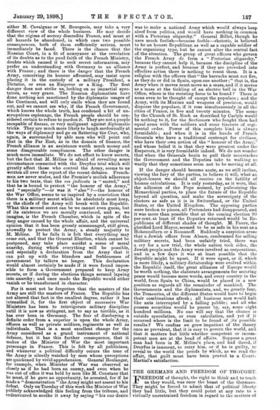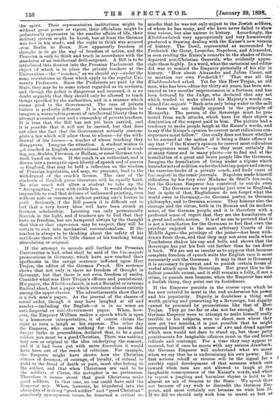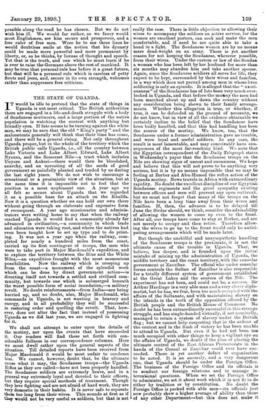THE GERMANS AND FREEDOM OF THOUGHT.
FREEDOM of thought, the right to think and to teach as they would, was once the boast of the Germans. They might be forced to admit that of political liberty they had little, but they could point at any rate to a virtually unrestrained freedom in regard to the matters of the spirit. Their representative institutions might be without great power or vigour, their officialism might be pedantically oppressive in the smaller affairs of life, their military system might be harsh, but at least the German was free in his study, and the right to think was secured .,:rom Berlin to Bonn. Now apparently freedom of shought is to go the way of freedom of action, and the Prussian is only to think and teach in accordance with the mandates of an intellectual drill-sergeant. A Bill is to be introduced this Session into the Prussian Parliament the object of which is to place the private teachers at the Universities—the "coaches," as we should say—under the same restrictions as those which apply to the regular Uni- versity Professors. Since the Professors are paid by the State, they may be to some extent regarded as its servants, and though the policy is dangerous and unsound, it is no doubt arguable that they should only be allowed to teach things specified by the authorities, and in a manner which seems good to the Government. The case of private tuition is perfectly different. It is almost impossible to imagine a worse infringement of intellectual liberty than to attempt a control over and a censorship of private teachers. It is true that the Bill has not yet been carried, and it is possible that it will not be carried, but that does not alter the fact that the Government actually contem- plate a law which will allow them to silence—by the with- drawal of his license—a teacher of whose teaching they disapprove. Imagine the situation. A student wishes to ,et coached in English constitutional history, and is read- ing, say, Stubbs, Freeman, or Hallam, or some German text- book based on them. If the coach is an enthusiast, and is drawn into a panegyric upon liberty of speech and of person iii England, that may be held a reflection on the wisdom of Prussian legislation, and may, we presume, lead to the withdrawal of the coach's license. The case of the students of English prose literature will be equally hard. No wise coach will allow a student to take up the " Areopagitica," even with treble fees. It would clearly be impossible to read that defence of unlicensed printing, even without note or comment, without putting one's license in peril. Seriously, if the Bill passes it is difficult not to feel that a very heavy blow will have been struck at German scholarship. Learning can only permanently flourish in the light, and if teachers are to feel that they have no freedom, but are hampered always by the thought that this or that expression may be suspect, they will be certain to sink into mechanical conventionalism. If the teacher is always to be thinking about the safety of his certificate there will be little chance of his teaching being stimulating or original.
If the attempt to muzzle still further the Prussian Universities is bad, what shall be said of the lese-majeste prosecutions in Germany, which have now reached their apotheosis in the savage sentence inflicted upon Herr Trojan, the editor of the German Punch. His sentence shows that not only is there no freedom of thought in Germany, but that there is not even freedom of smiles. Consider what was Herr Trojan's offence and punishment. His paper, the Kladderaclatsch, is not a Socialist or extreme Radical sheet, but a paper which circulates almost entirely among the upper classes. The advertisements show that it is a rich man's paper. As the journal of the classes of social order, though it may have laughed at all and sundry—including the English—it is in no sense an anti-Imperial or anti-Government paper. When, how- ever, the Emperor William makes a speech which is open to a humorous interpretation, it of course claims the right to turn a laugh at his expense. The other day the Emperor, who cares nothing for the maxim that danger lurks in generalities, declared that, to be a good soldier, you must be a good Christian. There was nothing very new or original in the idea underlying the remark, and if it had been put with more discretion it would have been out of the reach of criticism. For example, the Emperor might have shown how the Christian virtues of devotion, of courage, of loyalty, of refusal to yield to the dread of death or pain, must also belong to the soldier, and that when Christians are said to be the soldiers of Christ, the metaphor is no pretension. Therefore it comes about that good Christians make good soldiers. In that case, no one could have said the Emperor nay. When, however, he blundered into the absurdity of making "good soldier" and "good Christian" absolutely synonymous terms, he deserved a critical re- minder that he was not only unjust to the Jewish soldiers, of whom he has many, and who have never failed to show true valour, but also untrue to history. Accordingly, the Kladderadatsch very appropriately and very humorously produced a drawing dealing with the Kaiser's new version of history. The Devil, represented as surrounded by Frederick the Great, Leonidas, Napoleon, and Alexander, is seen reading the Kaiser's remarks to the shades of those departed non-Christian Generals, who evidently appre- ciate them highly. In a word, what the cartoonist and editor did was to remind the Emperor pictorially of his slip in history. How about Alexander and Julius Cmsar, not to mention our own Frederick ? ' That was all the inoulderaclatsch asked. Yet for this Herr Trojan, an old man, who has been editor for thirty-six years, has been sen- tenced to two months' imprisonment in a fortress, and has been lectured by the Judge, who declared that any act which tended to make absurd his Majesty's words con- tained lese-majesti. "Such acts only bring water to the mill: of those who are totally opposed to the principle of ' Monarchy. The person of the Sovereign must be pro- tected. from such attacks, which have for their object a diminution of the respect paid to him. The picture had a tendency to make people laugh at the Kaiser's words, and to say if the Kaiser's opinion be correct most ridiculous con- sequences must follow." One really does not know whether to be amused at the notion of it being a State offence to say that "if the Kaiser's opinion be correct most ridiculous consequences must follow "—as they most certainly do at many times and in many places—or to feel sad at the humiliation of a great and brave people like the Germans. Imagine the humiliation of living under a regime which hunts for acts of sedition under the blotting-paper and among the exercise-books of a private coach, and finds cases of lese-majeste in the comic journals. Napoleon made himself ridiculous by his fury over Madame de Stars bon-mots, but the German Emperor has contrived to out-do even this. The Germans are not popular just now in England, but in spite of that, Englishmen do not forget what the world owes to Germany,—to German poetry, to German philosophy, and to German science. They honour also the courage and the virtue, both in its Roman and its modern sense, of the German people, and it is therefore with a profound sense of regret that they see the humiliation of a great and noble nation. It is of no use to pretend that it is not a humiliation for the Germans to feel that even the privilege enjoyed in the most arbitrary Courts of the Middle Ages—the privilege of the jester—has been with- drawn from them, and that they may not even smile when Touchstone shakes his cap and bells, and shows that the Sovereign has put his foot out farther than he can draw it back. We are not so insular as to suppose that because complete freedom of speech suits the English race it must necessarily suit the Germans. It may be that in Germany it is necessary to prevent and to punish certain forms of verbal attack upon the Sovereign. But grant this to the fullest possible extent, and it still remains a folly, if not a crime, to punish men because, when the Emperor has said a foolish thing, they point out its foolishness.
If the Emperor persists in the course upon which he has now entered he must in the end undermine his power and his popularity. Dignity is doubtless a thing well worth gaining and preserving by a Sovereign, but dignity cannot be procured by prosecutions like that of Herr Trojan. They go too far or else not far enough. If the German Emperor were to attempt to make himself really terrible to his subjects, were to shoot men where they now get two months, it is just possible that he might surround himself with a sense of awe and dread against which men would not dare to stand up, but these petty punishments for laughable offences must in the end breed ridicule and contempt. For a time they may appear to succeed, but if once he meets with any serious drawback, the German Emperor will understand what we mean when we say that he is undermining his own power. His first serious rebuff or reverse will be the signal for a I terribly rapid development of that soreness which eats inward when men are not allowed to laugh at the laughable consequences of the Kaiser's words, and when to repeat a jingling and harmless rhyme is held to be almost an act of treason to the State. We speak thus not because of any wish to discredit the German Em- peror, and most certainly not because we wish him ilL If we did we should only wish him to travel as fast as possible along the road he has chosen. But we do not wish him ill. We would far rather, as we fancy would most Englishmen, see him secure and prosperous, and a free ruler of free men. Were he to see these lines he would doubtless smile at the notion that his dynasty could be made more powerful and more permanent by liberty, or, as he thinks, by license of thought and speech. Yet that is the truth, and one which he must learn if he is ever to raise the Germans above the rest of mankind: It may be true that personal rule has before it a great future, but that will be a personal rule which is careless of petty flouts and jeers, and, secure in its own strength, welcomes rather than suppresses free criticism.




















































 Previous page
Previous page